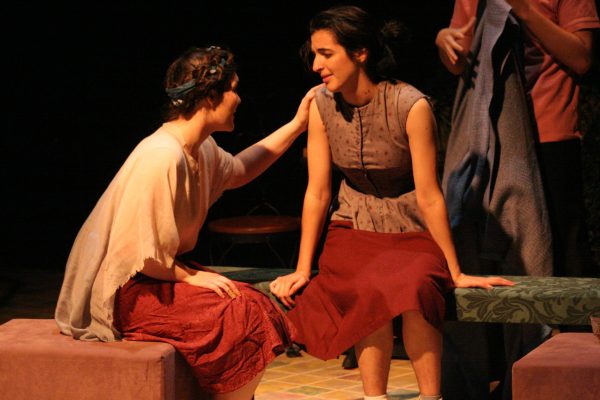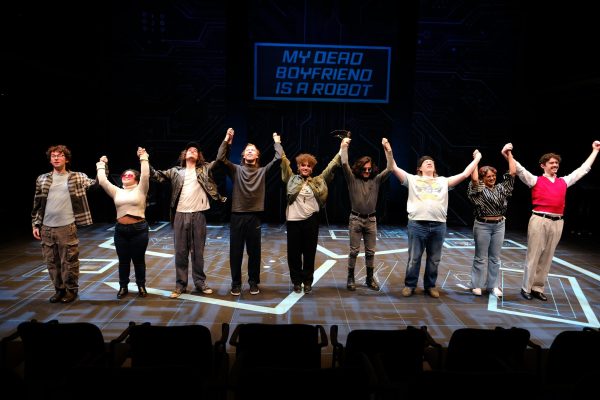Queer Romance, Intimate Staging Elevate “Circle Mirror Transformation”
Circle Mirror Transformation, the first play in the 2017 — 2018 series of the Oberlin College Theater Lab Series, opened yesterday evening in Warner Main Space. The play tells a meta-theatrical narrative about five people in small-town Vermont who have come together for a community theater class. Over the six weeks that they are together, friendships are made, relationships form and fail, and the newfound classmates engage in some very silly acting games — telling stories where everybody can only add one word at a time, or “passing” words and motions around in a circle, changing them slightly every time. This exercise is where the name of Circle Mirror Transformation originates.
“[The play] is so unique,” said College sophomore Meg Franz, who plays Teresa, a former actress. “The line between theater and real life doesn’t exist with this play. When you see it, it’s like the thing is actually happening right in front of you. It’s not like, ‘I’m going to see this to see a story, to see a plot progress.’ The line is so thin between what’s actually theater and what’s actually real life.”
Adding to that sense of realism is Director and College senior Han Taub’s decision to stage the play in the round, taking advantage of the space in Warner Main to seat audience members on all four sides of the stage.
“There’s audience on every single side, basically making a big rectangle that serves as our studio,” Taub said. “It provides a really intimate space that can be challenging as a director and also challenging to the actors and to the audience because everyone is in there so close, and there’s not as much separation between the audience and the characters. I think that’s really good for this particular show.”
This intimate staging decision adds interest to an otherwise extremely minimal set. The only props on stage are an exercise ball and a hula hoop — all of the focus is on the actors themselves.
The play is very modern, having opened Off-Broadway in 2009. That same year, it shared the Obie Award for Best New American Play. College sophomore Miranda Purcell, who plays high school junior Lauren, thought that the modern and honest language of the play was especially appealing.
“The playwright, Annie Baker — her dialogue is very honest,” Purcell said. “It’s telling of how people speak in reality. It’s not filled with flowery language, and there’s a lot of pauses, and the characters will retrace their words. [Sometimes] a character says something that they wish they didn’t say, and then they get uncomfortable about it because that’s how normal people would react. So it feels very real, and those lines where characters reveal too much and are almost ashamed about it, or are nervous about it and then try to stumble back on their words, really … makes it more alive and human.”
In every aspect of the production, Circle Mirror Transformation emphasizes compassionate recognition of human vulnerability. This idea is at the heart of the play, especially when the actors are doing silly exercises on stage.
“All these exercises may seem kind of ridiculous, but they’re all centered on vulnerability and being able to completely make a fool of yourself in front of everyone,” Franz said. “They may seem very strange, and they probably will even to people who have acted before, … but if you’ve never acted, these are really helpful things to do.”
“All our characters mess up at some point during games because they’re unsure,” Purcell added. “Everyone is learning together as the show goes on, and you really see improvements when we re-do games. You can see the characters growing and becoming more confident.”
There is only one romantic relationship arc in the play: between Teresa and the recently-divorced Schultz. In the original play, Schultz is a man. Taub, however, made the decision to reimagine Schultz as a woman to explore this relationship from a different angle.
“I wanted a chance to explore queer relationships, especially in terms of the queer relationships of older women,” Taub said. “I was really interested in seeing how that kind of dynamic functions in this kind of a space, and with that kind of a plotline. [I think] it lets more people see themselves in the play, which is something that I’m really invested in. It creates a story with a lot more nuance than it was originally written with, simply because the politics of identity insert themselves even more [into the narrative].”
In the end, by centering on a group of people who have come together because they are drawn to acting, Circle Mirror Transformation raises the inevitable question — what is it about theater that gives it such an enduring appeal? In this case, it draws in the characters in this play, the dramatic team involved with portraying them, and the audiences who are coming to see their story. For Taub, the answer lies in the emotionally liberating power of theater.
“I think, in general, the reason that theater persists is that it gives us permission to feel things fully and deeply in a way that we’re conditioned not to in our lives,” they said. “The society that we live in conditions us to hold back emotion and not show it, and to not feel emotions fully all the time. I think going and seeing theater is an exercise in being given permission to let those barriers go and really engage on an emotional level that we don’t normally get to. I think that’s why theater has persisted and will persist forever.”







